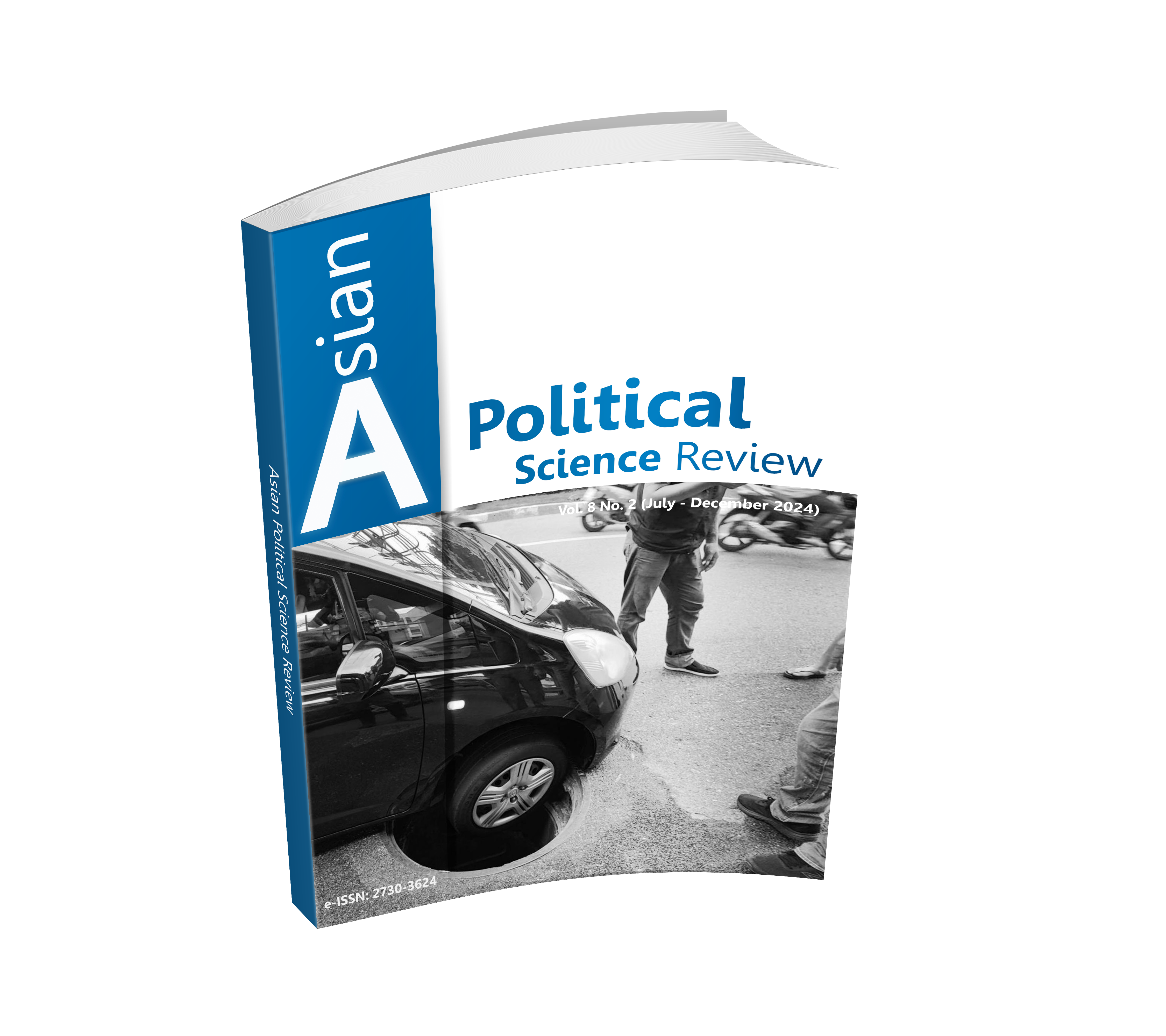NEGOTIATING POWER: THE POLITICAL LANDSCAPE OF MUHAMMADIYAH IN SOUTH SULAWESI, INDONESIA
DOI:
https://doi.org/10.14456/apsr.2024.12Keywords:
Muhammadiyah, Political Islam, Indonesia, South Sulawesi, Political ParticipationAbstract
This article aims to unveil the multifaceted elements that shape Muhammadiyah's distinctive political experience in South Sulawesi. Our analysis explores the historical context, meticulously examining Muhammadiyah's early interactions with colonial and post-colonial governments in South Sulawesi. We will dissect how these interactions informed the organization's evolving approach to political participation, shaped by the need to navigate the complexities of the colonial landscape and the subsequent jostling for power in the promising Indonesian republic in the context of 2024 election. The organization's internal dynamics, particularly its perspectives on Islamic political participation, will also be meticulously explored. We will unveil the various interpretations within Muhammadiyah regarding the role of Islam in the public sphere and how these interpretations influence the organization's engagement with political parties, elections, and policy advocacy. Finally, we will meticulously analyze the specific ways in which Muhammadiyah negotiates its power within South Sulawesi's contemporary political landscape. By meticulously examining these historical, internal, and contemporary factors, this study aspires to illuminate the multifaceted relationship between Muhammadiyah and politics in a crucial Indonesian region. This will provide a deeper understanding of how a prominent Islamic organization like Muhammadiyah shapes and is shaped by the intricate political forces at play within a specific regional context.
Downloads
References
Ahmari-Moghaddam, A. (2012). Towards International Islamic Human Rights: A comparative study of Islamic Law, Shari’ah, with universal human rights as defined in the International Bill of Human Rights. Master of Laws Thesis, University of Toronto.
Ali, M. (2018). Khutbahs and fatwas in colonial Indonesia and Malaya. In N. Hosen. (ed.). Research Handbook on Islamic Law and Society (pp. 428-452). Cheltenham: Edward Elgar Publishing.
Aspinall, E., & Mietzner, M. (2014). Indonesian Politics in 2014: Democracy’s Close Call. Bulletin of Indonesian Economic Studies, 50(3), 347-369.
Bertrand, J. (2004). Nationalism and Ethnic Conflict in Indonesia. Cambridge: Cambridge University Press.
Boyle, J. (1998). Cultural influences on implementing environmental impact assessment: insights from Thailand, Indonesia, and Malaysia. Environmental Impact Assessment Review, 18(2), 95-116.
Brown, G. (2019). Civic Islam: Muhammadiyah, NU and the Organisational Logic of Consensus-making in Indonesia. Asian Studies Review, 43(3), 397-414.
Buchan, J. (2013). The Iranian revolution of 1979. Asian Affairs, 44(3), 418-426.
Davidson, J., & Henley, D. (2007). The Revival of Tradition in Indonesian Politics: The Deployment of Adat from Colonialism to Indigenism. London: Routledge.
Fealy, G., & White, S. (eds.). (2008). Expressing Islam: Religious life and politics in Indonesia. Singapore: Institute of Southeast Asian Studies.
Jones, G. (2006). A demographic perspective on the Muslim world. Journal of Population Research, 23, 243-265.
Kersten, C. (2015). Islam in Indonesia: The Contest for Society, Ideas and Values. Oxford: Oxford University Press.
Latief, H., & Nashir, H. (2020). Local Dynamics and Global Engagements of the Islamic Modernist Movement in Contemporary Indonesia: The Case of Muhammadiyah (2000-2020). Journal of Current Southeast Asian Affairs, 39(2), 290-309.
Meijer, W. (1989). Ecology of Two Indonesian Islands. The Quarterly Review of Biology, 64(2), 180-182.
Nakamura, M. (2012). The Crescent Arises Over the Banyan Tree: A Study of the Muhammadiyah Movement in a Central Javanese Town, C. 1910-2010. Singapore: Institute of Southeast Asian Studies.
Porter, D. (2002). Citizen participation through mobilization and the rise of political Islam in Indonesia. The Pacific Review, 15(2), 201-224.
Qodir, Z., Jubba, H., Mutiarin, D., & Hidayati, M. (2021). Muhammadiyah identity and muslim public good: Muslim practices in Java. International Journal of Islamic Thought, 19, 133-146.
Rahnema, A. (ed.). (1994). Pioneers of Islamic Revival. London: Palgrave Macmillan.
Ramstedt, M. (2003). Hinduism in Modern Indonesia. Oxfordshire: Taylor & Francis.
Sabila, A., Nurhakim, N., & Romelah, R. (2023). Muhammadiyah Renewal in the Frame of Islamic Education and Social Change. TA'LIM: Jurnal Studi Pendidikan Islam, 6(1), 86-101.
Ubaedillah, A. (2017). The Rise of the Khalwatiyah Sammān Sufi Order in South Sulawesi: Encountering the Local, Escaping the Global. Studia Islamika, 24(2), 213-246.
Van Amersfoort, H., & Van Niekerk, M. (2006). Immigration as a Colonial Inheritance: Post-Colonial Immigrants in the Netherlands, 1945-2002. Journal of Ethnic and Migration Studies, 32(3), 323-346.
Weintraub, A. (ed.). (2011). Islam and Popular Culture in Indonesia and Malaysia. London: Routledge.
Whitfield, S. (1996). The Culture of the Cold War. Maryland: JHU Press.

Downloads
Published
How to Cite
Issue
Section
License
Copyright (c) 2024 Authors

This work is licensed under a Creative Commons Attribution-NonCommercial-NoDerivatives 4.0 International License.











.png)


